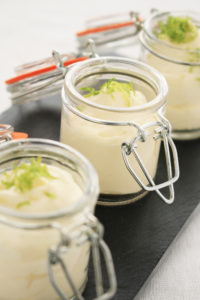





Scientists are learning more every day about the importance of the gut microbiome. The gut is now being referred to as our “second brain”. Research has linked the gut microbiome to a variety of physical diseases and even mental disorders. As a result of this, probiotic rich fermented foods, probiotic supplement sales, and cultured dairy products like yogurt and kefir are more popular than ever.

Microorganisms
What is a microbiome?
We inherit more than 22,000 genes from our parents. The bacteria that exist in — and on — our bodies contain at least eight million bacterial genes. That’s 360 times more bacterial genes than human genes! The bacteria that we carry inside and outside of the human body are known as the human microbiome
The “gut microbiome” is a collection of many types of bacteria that live in our gastrointestinal tract – also called the digestive tract. This includes the mouth, esophagus, stomach, small intestine, and large intestine. Scientists estimate that we each carry 100 trillion bacteria in our digestive tract alone!
We have a symbiotic relationship with our gut microbiome. We (the host) provide an environment for bacteria to thrive. In return, gut-dwelling bacteria keep pathogens (harmful micro-organisms) in check, aid digestion and nutrient absorption, and contribute to immune function.

What are probiotics?
Probiotics are formulations that contain healthy gut bacteria to replace or improve our digestive microorganisms. You know those 100 trillion bacteria in our digestive tract? There are some strains of bacteria that are especially important in supporting various aspects of our physical and mental health.
Probiotics are “good” bacteria that:

Gut bacteria affects mental health
Researchers believe changes in gut bacteria may even affect the brain and personality. Germ-free mice have been shown to be dramatically more anxious and hyperactive than their counterparts with a normal microbiome. They concluded that the presence or absence of intestinal microbiota influences the development of behavior, and is accompanied by neurochemical changes in the brain.
More recently, researchers at the University of Cork, looked at whether or not the fear response was altered in mice that were raised in a completely germ-free environment, and therefore had a deficient microbiome.
They found that the amygdala – which is the area of the brain responsible for emotional ‘regulation’, appears to be hyperactive in microbiota deficient subjects. This can lead to an unmodulated response to fearful memories, and therefore create a tendency towards phobias or post-traumatic stress disorders for example.
One of the lead researchers on this study, Dr. John Cryan said:
“It is turning upside down how we might develop strategies for fear and anxiety. It is a very exciting time for us.’’
While more work is still needed to fully understand the mechanisms behind the relationship between the microbiota and fear responses, Dr. Cryan said it was likely ‘’that key signals from the gut to the brain act as regulators of the fear response.’’
He added that: “We are very excited about this because it is probably one of the first direct links to fear pathways,” and “We now know that for normal fear responses we need to have appropriate microbes in our gut.”
Probiotic killers:
Most Americans don’t consume enough probiotics in their diet due to modern processed foods, soil depletion, and other environmental factors. On top of that, there are things that will kill off, or heavily burden our good bacteria.
However, the balance of “good” and “bad” bacteria can be altered in two ways. Antibiotics kill both bad and good bacteria in the gut. Basically, anything that kills bacteria kills both good and bad bacteria. Certain disease-carrying bacteria, fungi, parasites, and yeasts can also upset the balance. For example, Helicobacter pylori (H. pylori) can cause ulcers and chronic inflammation (infection) of the stomach. Irritable bowel syndrome, Crohn’s disease, and vaginal infections are all linked with “bad” bacteria. Sugar feeds yeast, which will create a bigger burden on good bacteria to keep the yeast in check. The gut microbiome is a powerful regulator of our stress and anxiety. The more stress the microbiome has to mediate, the more taxed the microbiome becomes.

Add soil-based probiotics (SBOs)
Soil-based organisms or probiotics are bacteria that live in soil or dirt. Our ancestors had a close relationship with the soil. They ate off of the ground. They ate fruits and leaves that came directly from the ground. And they ate with hands that were teeming with bacteria from the “dirt” they encountered in their everyday lives. Nowadays, we have much less contact with the soil. We wash our hands before meals and we wash all of the dirt off of fruits and vegetables before consuming them. This removes a lot of “bad” bacteria, like cold viruses. But this gives us far less exposure to soil-based bacteria than what our bodies are designed to have in our digestive systems. In industrialized nations today, we lack many of strains of gut bacteria that can still be found among indigenous peoples who are not exposed to modern farming techniques.
While “regular” probiotics from fermented foods are beneficial, there is some strong evidence to suggest that soil-based organisms (SBOs) are the most beneficial of all. Lactobacillus, acidophilus and bifidobacteria, the bacterial species typically found in yogurt and traditional probiotic supplements, do not have the naturally protective shell that is inherent to all soil-based, spore-forming bacteria, so they cannot withstand gastric acids. While these types of bacteria can have benefits, unfortunately very few of these organisms ever reach the lower intestine.
SBO probiotics have a simple, natural advantage. “Bacterial spores offer the advantage of a higher survival rate during the acidic stomach passage and better stability during the processing and storage of the food product,” writes researcher Johannes Bader, from the Technische Universitat Berlin.
A recent study recruited 44 adults all of whom had IBS (Irritable Bowel Syndrome) with either mild to moderate anxiety or depression. The study participants were divided in to two groups. One group was given a daily dose of the soil-based probiotic strain Bifidobacterium longum NCC3001, and the other group were given a daily placebo. After six weeks both groups were subjected to psychological analysis and also Magnetic Resonance Imaging of the brain. Results showed that 64% of participants in the probiotic group saw reduced depression scores of at least two points, compared to only 32% from the placebo group reporting the same improvements.
Additionally, results from the MRI testing verified that reductions in depression scores were accompanied by changes in the area of the brain involved in mood regulation.
One of the study authors, Dr. Premysl Bercik commented that:
‘This opens new avenues not only for the treatment of patients with functional bowel disorders but also for patients with primary psychiatric diseases.”

Consume a wide variety of probiotic strains
There are many different types of strains of probiotics. The health effects experienced by one probiotic may be completely different from the health benefits seen from another probiotic.
Certain strains of probiotics support a healthy immune system. Others are great for digestion and some can help support a healthy metabolism and stabilize moods.
That’s why it’s important to consume a wide range of probiotics in your food to get the maximum benefit from all the different types.
Also, avoid the probiotic “killers” as much as possible. Grow some of your own food for soil-based probiotics and generally spend more time in good old dirt!
Thank a million times for adding to our knowledge by means of your posts. Keep sharing.
Question.
What about enteric coated probiotics?
Do you get protection from the gastric acids?
Thanks so much.
I really appreciate this information.